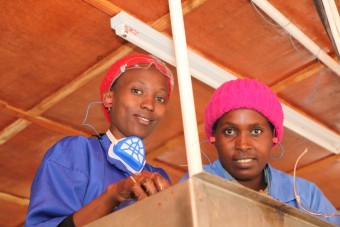
Menstrual hygiene matters to all
Puberty education and access to affordable menstrual hygiene supplies can change the lives of women and girls, preventing lost time at school and work that can translate directly to a better quality of life.
Menstrual hygiene matters – for women and girls, for men and boys, for communities and for us all. The issue profoundly impacts individuals, but when girls and women miss school and work, their families and communities suffer as well. Empowering women to create sustainably produced sanitary pads which are sold at affordable prices to their friends and neighbors benefits all involved.
Lack of education about menstruation and the lack of supplies and sanitary conditions are widening the gender gap in education and finances.
- A study at a school in Uganda found that half of the girls missed one to three days of school each month.
- UNESCO estimates that 1 in 10 African girls miss school during menses, eventually leading to a higher school dropout rate.
- In Ghana, girls miss as many as five days of school each month, due to inadequate sanitation, lack of hygiene products and physical discomfort, such as cramps.
- Commercial pads can be too expensive for low-income girls and women. In Mukuru, in Nairobi, many girls ages 10 to 19 reported having sex with older men to pay for basic items, such as pads.
- In one study by HERproject, 73 percent of the Bangladeshi garment workers interviewed miss work an average of six days per month – unpaid – due to vaginal infections caused by unsanitary menstrual materials.
But there is a path to change.
- In Ghana, girls’ school attendance increased substantially when they were given free sanitary pads and puberty education.
- The Kenyan government will spend more than $2 million US dollars to provide pads to low-income school girls.
- Social enterprises such as Azadi (India), AfriPads (Uganda), SHE – Sustainable Health Enterprises (Rwanda), Zana Africa (Kenya) and Huru (Kenya) sell sanitary products that are produced locally, creating both jobs and affordable pads.
— Used with permission by WASH-United
Use social media to increase awareness and learn more:
#SHE500 and #SHE28 (Sustainable Health Enterprises)
#menstruationmatters (Menstrual Hygiene Day)
#pointperiod (Her Turn)
